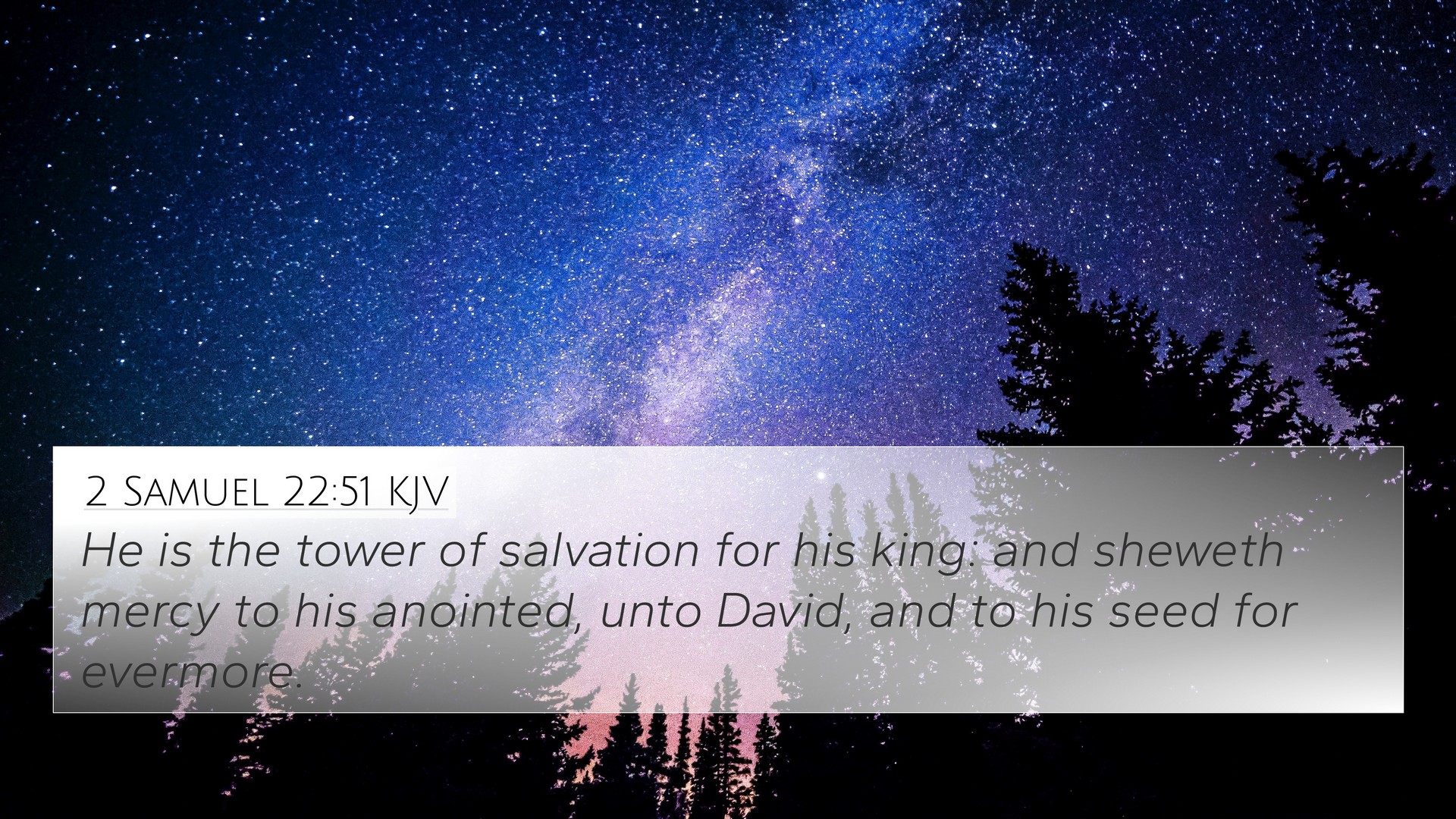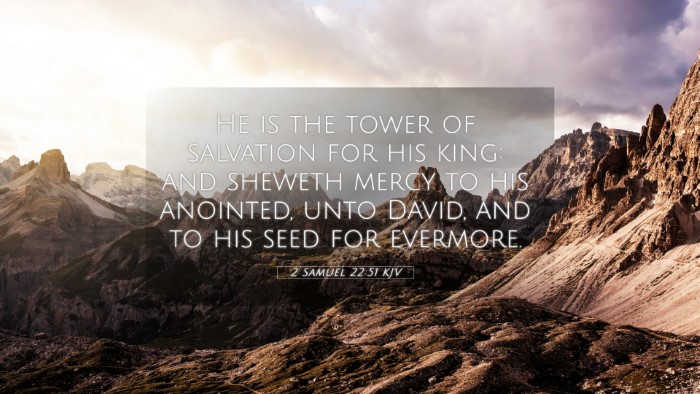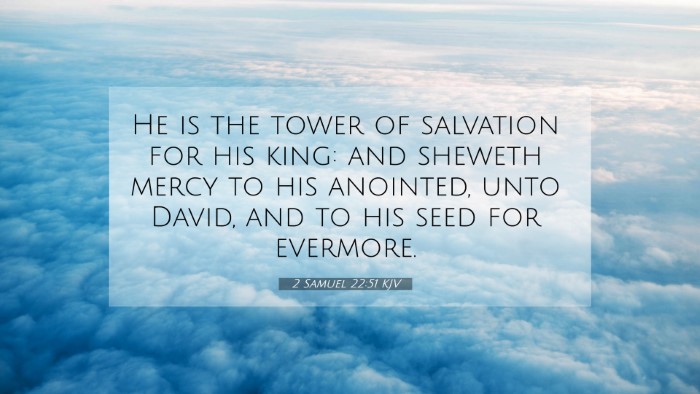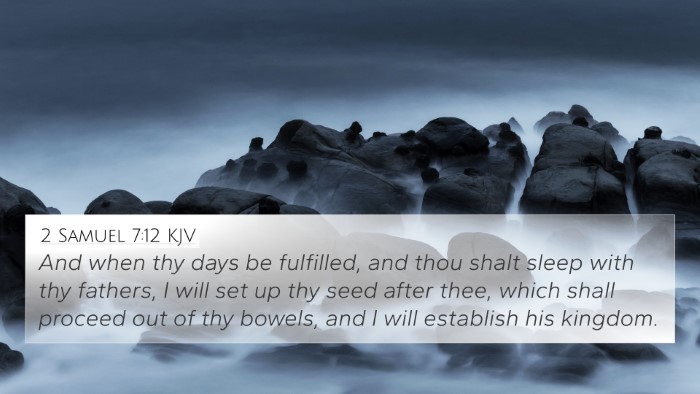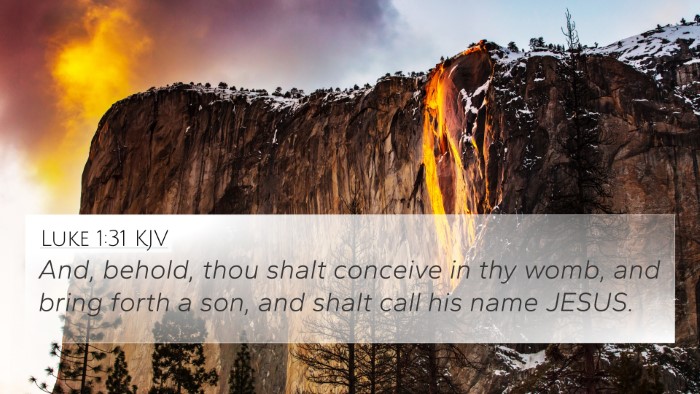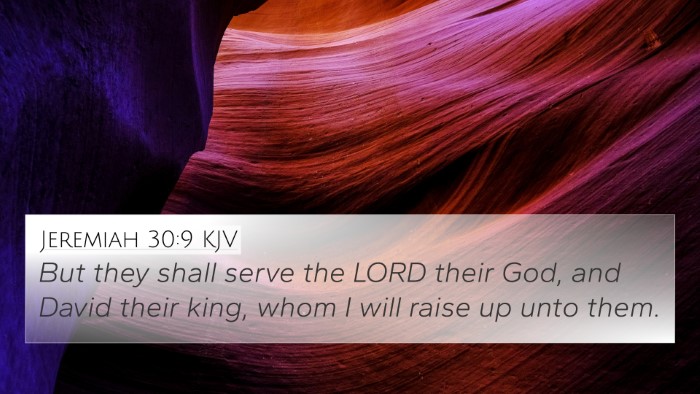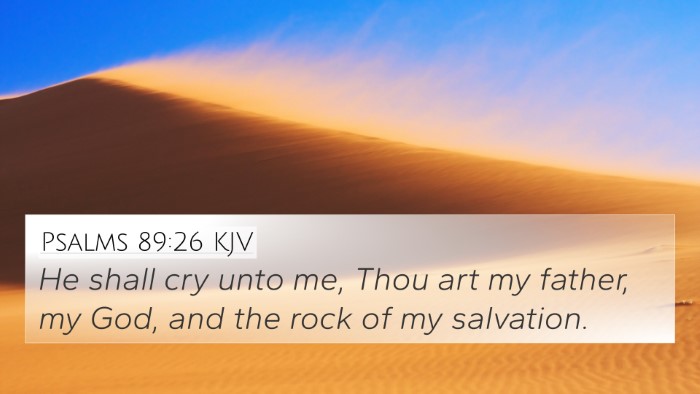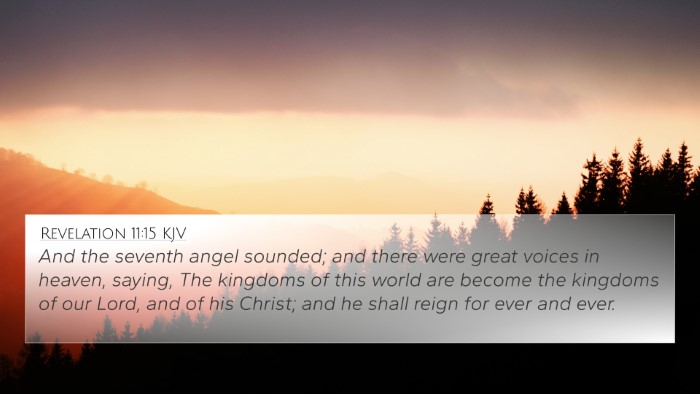2 Samuel 22:51 Meaning and Interpretation
In 2 Samuel 22:51, the scripture states, "He is a tower of salvation for his king, and shows mercy to his anointed, to David and his descendants forever." This verse encapsulates the themes of divine protection, mercy, and the enduring covenant between God and David's lineage.
General Themes
- Divine Protection: The "tower of salvation" imagery represents God as a stronghold and refuge for His people, particularly for David, illustrating the assurance of God's protection in times of distress.
- Covenant Relationship: The mention of David and his descendants highlights God's fidelity to His promises, signifying the importance of the Davidic covenant in the unfolding narrative of the Israelite history.
- Mercy of God: God's mercy is reiterated, emphasizing His compassion not only to David but to all those who seek refuge in Him.
Commentary Insights
- Matthew Henry: Henry emphasizes that this verse affirms God's faithfulness in delivering and protecting His anointed leaders. God's mercy is not fleeting but extends to generations, showcasing His unwavering covenant relationship.
- Albert Barnes: Barnes notes that the "tower" symbolizes a safe place amidst adversities. His interpretation suggests that all who trust in God's promises find solace and help in Him, affirming the spiritual refuge He provides.
- Adam Clarke: Clarke's commentary highlights the theological implications of this verse, stating that it not only reflects God's care for David but also prefigures the Messiah's role as a savior, linking the Old Testament narrative to the New Testament fulfillment.
Cross-References
This verse interlinks with various other Biblical texts, enhancing its thematic depth. The following are significant cross-references that elucidate its meaning:
- Psalm 18:2: "The Lord is my rock, my fortress, and my deliverer." - A direct reflection of God's protective nature, mirroring 2 Samuel 22:51.
- Psalm 89:28: "My faithful love will be with him, and through my name his horn will be exalted." - Relates to the promise of mercy extended to David's lineage, consistent with the covenant promises.
- Isaiah 55:3: "I will make an everlasting covenant with you, my faithful love promised to David." - Emphasizes the permanence of God's covenantal relationship with David and his descendants.
- Acts 2:30: "Seeing what was to come, he [David] spoke of the resurrection of the Messiah." - This connects the messianic lineage back to David, affirming God's promise of mercy and salvation through him.
- Hebrews 1:5: "For to which of the angels did God ever say, 'You are my Son; today I have become your Father'?" - This verse highlights the unique relationship between God and Jesus, the ultimate fulfillment of the mercy promised to David's descendants.
- Luke 1:70-72: "As he said through his holy prophets long ago, salvation from our enemies, and from the hand of all who hate us..." - This section connects the prophecy of salvation from enemies, a promise rooted in God's mercy to David.
- Revelation 22:16: "I, Jesus, have sent my angel to give you this testimony for the churches. I am the Root and the Offspring of David..." - This explicitly links Jesus, God’s anointed, back to David, confirming the eternal nature of His mercy towards David's lineage.
Thematic Connections and Insights
2 Samuel 22:51 serves as a vital point of inter-Biblical dialogue, offering insights into God’s enduring relationship with His people. This dialogue spans both Old and New Testaments, revealing a thematic continuity regarding God's mercy and protection. Below are some interpretations and connections formulated through comparative Bible verse analysis:
- Identifying connections between Old and New Testament: The assurance of divine protection in 2 Samuel resonates with New Testament assurances where Jesus promises eternal security to believers (John 10:28).
- Cross-referencing Psalms with New Testament teachings: Psalms often reflect on the promises of God, affirmatively answered in the life and ministry of Jesus (see Psalm 22 with Matthew 27). The thematic elements of rescue and deliverance recur throughout scripture.
- Comparative study of Pauline epistles: Paul often reflects on God's mercy and salvation in his letters, echoing themes present in the historical narrative of David's experiences (Romans 11:30-32).
Conclusion
In summary, 2 Samuel 22:51 reinforces the identity of God as a protective tower and faithful God who generously shows mercy to His anointed ones. Through various cross-references and commentaries, this verse reveals a profound theological significance that extends beyond its immediate historical context. By engaging in cross-referencing and thematic connections, we gain a greater understanding of how God has intertwined His purpose and plan throughout scripture.
